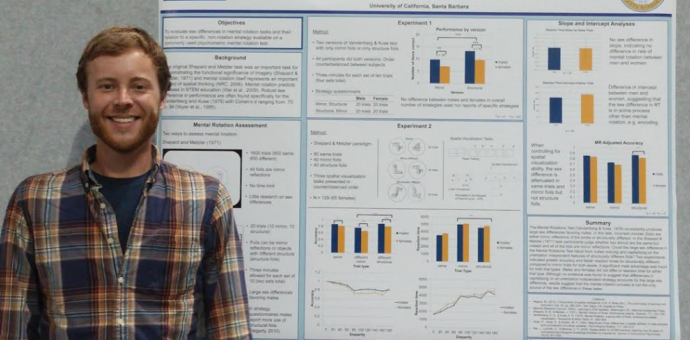Top Stories
Popular news shows like Good Morning America and publications like Science News Daily are talking about research on gender in navigation conducted right here at the UCSB Hegarty Spatial Thinking Lab. In this GradPost feature, we chatted with Psychological & Brain Sciences grad student Alexander Boone to set the record straight about what his research is all about.
 Popular news shows like Good Morning America and publications like Science News Daily are talking about research on gender in navigation conducted right here at the UCSB Hegarty Spatial Thinking Lab.
Popular news shows like Good Morning America and publications like Science News Daily are talking about research on gender in navigation conducted right here at the UCSB Hegarty Spatial Thinking Lab.
All this media buzz centers around an article titled "Sex differences in navigation and strategy" published in Memory and Cognition earlier this year.
In this GradPost feature, we chatted with the article's lead author Alexander Boone, a â5th-year Psychological and Brain Sciences graduate student researcher âin the Hegarty Lab. Boone sets the record straight about the article, the goals of his research work at the Hegarty Lab, and what drives him as a scholar at UCSB.
What motivates your graduate research at UCSB?
This probably sounds silly in a way but I am really motivated by the pursuit of research, especially in the spatial cognition domain. The questions do not need to be huge for me to be interested in pulling off a way to study it. I like to untangle the data. Also, in some ways I have been motivated just by being in a really good research unit within PBS. We have a weekly seminar in which graduate students and post docs (sometimes faculty) present their research ideas which can be at either the planning stage or ongoing work. For me, these seminars have been a very useful place to get my ideas out in a low stress environment and those ideas have blossomed into published work now.
What is it like working with Dr. Mary Hegarty and your colleagues at your department?
As I said above, our cognitive seminar is very fruitful. Working with Mary has been great and it has put me into contact with other internationally renowned researchers interested in similar ideas, which we've co-authored with now. Also, I feel as if much of the faculty in this department are very willing to collaborate, which is beneficial. For instance, I am now working in collaboration with another lab in PBS that uses EEG and other cognitive neuropsychology methods which I have not formally used. On top of that, our lab is collaborating with another group investigating hormones and aging. Being able to work in these collaborations has opened my eyes to how difficult some of this research can be and what processes they go through to answer some of their questions.
Congratulations on the article and the great public interest into your research! Can you tell us a bit about your research process? Also, what misconceptions about your paper have you encountered?
Thank you! So far, my process has been to find a hole in the literature and plug it with some new information. A lot of times I see read a few papers and find a ton more to read and realize that the citations go in circles and something is missing. For instance, with our recently published work on sex difference in navigation strategy, we knew that there were self-reported sex difference in navigation strategy, but no one had ever looked to see if that was true in the objective data, when people were actually asked to navigate. As it turns out, we found that males were more like to take shortcuts in a known environment whereas women were more like to use learned routes. However, I think the point that some of the recent popular press media coverage has missed is that these are overlapping distributions. This is a general effect and does not mean that all women are so-called "poor" navigators.
My day-to-day scientific process is to run a lot of my own participants. I feel like I need to observe the behaviors and hear some questions from participants as the collection unfolds to see what is actually happening and get a better understanding of the processes that people are going through mentally. I also spend a fair amount of time with newly collected data thinking about how to plot the data to understand what people were actually thinking. It's not an easy task and there is a lot of back and forth testing out ideas. Sometimes this unfolds into figuring out new manipulations in an experiment.
What are your future goals/plans for your research work?
Overall, I'm basically trying to understand the mechanisms of our strategies in various aspects of spatial cognition. There are so many questions that need to be explored. I want to keep investigating spatial cognition and thinking about how people think about the space around them. Right now I am focusing on the effects of stress on navigation but also on how certain methodologies and instruction influence the expression of ability and how that relates to strategy in virtual environments.
What inspires you to do what you do, each day?
Golly, that's a hard question for me. Day to day, I find it difficult to move on to new tasks during the day if something isn't wrapped up. I think I'm driven by some sort of compulsion to get things done but also by the fact that I really like what get to do everyday. But, in a general sense, perhaps I am driven by academia itself. I want to get to that next level and you keep hitting small goals until you move up or out. Since I don't want to move out, I push to get stuff done.
